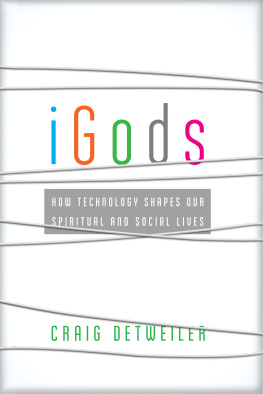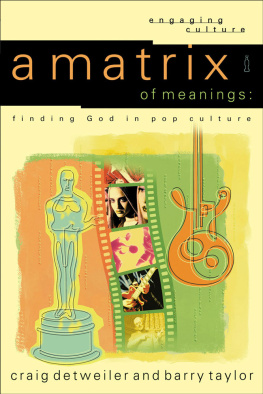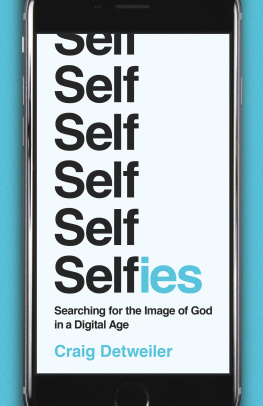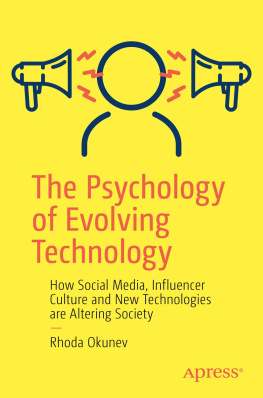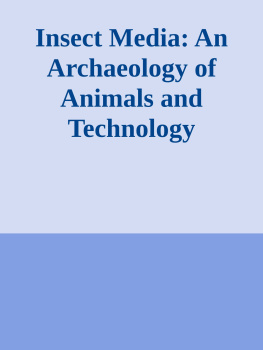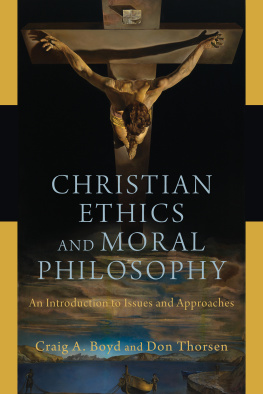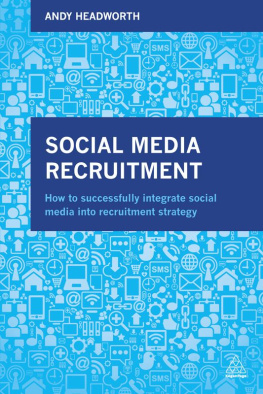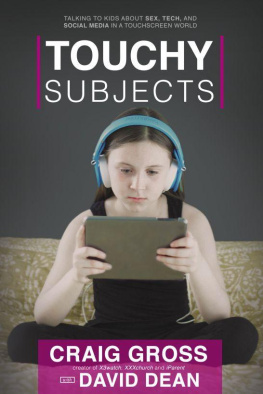Craig Detweiler - iGods: How Technology Shapes Our Spiritual and Social Lives
Here you can read online Craig Detweiler - iGods: How Technology Shapes Our Spiritual and Social Lives full text of the book (entire story) in english for free. Download pdf and epub, get meaning, cover and reviews about this ebook. year: 2013, publisher: Baker Publishing Group, genre: Romance novel. Description of the work, (preface) as well as reviews are available. Best literature library LitArk.com created for fans of good reading and offers a wide selection of genres:
Romance novel
Science fiction
Adventure
Detective
Science
History
Home and family
Prose
Art
Politics
Computer
Non-fiction
Religion
Business
Children
Humor
Choose a favorite category and find really read worthwhile books. Enjoy immersion in the world of imagination, feel the emotions of the characters or learn something new for yourself, make an fascinating discovery.
- Book:iGods: How Technology Shapes Our Spiritual and Social Lives
- Author:
- Publisher:Baker Publishing Group
- Genre:
- Year:2013
- Rating:5 / 5
- Favourites:Add to favourites
- Your mark:
- 100
- 1
- 2
- 3
- 4
- 5
iGods: How Technology Shapes Our Spiritual and Social Lives: summary, description and annotation
We offer to read an annotation, description, summary or preface (depends on what the author of the book "iGods: How Technology Shapes Our Spiritual and Social Lives" wrote himself). If you haven't found the necessary information about the book — write in the comments, we will try to find it.
iGods: How Technology Shapes Our Spiritual and Social Lives — read online for free the complete book (whole text) full work
Below is the text of the book, divided by pages. System saving the place of the last page read, allows you to conveniently read the book "iGods: How Technology Shapes Our Spiritual and Social Lives" online for free, without having to search again every time where you left off. Put a bookmark, and you can go to the page where you finished reading at any time.
Font size:
Interval:
Bookmark:

2013 by Craig Detweiler
Published by Brazos Press
a division of Baker Publishing Group
P.O. Box 6287, Grand Rapids, MI 49516-6287
www.brazospress.com
Ebook edition created 2013
All rights reserved. No part of this publication may be reproduced, stored in a retrieval system, or transmitted in any form or by any meansfor example, electronic, photocopy, recordingwithout the prior written permission of the publisher. The only exception is brief quotations in printed reviews.
ISBN 978-1-4412-4481-9
Library of Congress Cataloging-in-Publication Data is on file at the Library of Congress, Washington, DC.
Unless otherwise indicated, Scripture quotations are from the Holy Bible, New International Version. NIV. Copyright 1973, 1978, 1984, 2011 by Biblica, Inc. Used by permission of Zondervan. All rights reserved worldwide. www.zondervan.com
Scripture quotations labeled KJV are from the King James Version of the Bible.
Scripture quotations labeled NKJV are from the New King James Version. Copyright 1982 by Thomas Nelson, Inc. Used by permission. All rights reserved.
Scripture quotations labeled NLT are from the Holy Bible , New Living Translation, copyright 1996, 2004, 2007 by Tyndale House Foundation. Used by permission of Tyndale House Publishers, Inc., Carol Stream, Illinois 60188. All rights reserved.
All illustrations are the work of Brandon Scheirman.
The image that appears in the illustration on page 44 was taken by Matthew Yohe (Matthew Yohe/Wikimedia Commons/cc=BY=3.0).
Contents
iGods
Aesthetics First
Personalized Abundance
Algorithmic Authority
Authentic Frenemies
Audience Participation
The Telos of Technology
Acknowledgments
While writing appears to be a solitary craft, it is built upon the work and words of others. Like research and technology, advances arise by merging previous ideas into new forms, shapes, and applications. Yes, there are moments of blinding insight, unexpected breakthroughs, and divine sparks. But they arise in an incubator formed through reading and studying, teaching and testing, reflection and prayer.
I am grateful to the communities that made this book possible. First and foremost, I am grateful for my wife-for-life, Caroline Cicero, and our children, Zoe and Theo, who endured far more of this book than they deserved to. Whatever romance they may have harbored about the glamour of the writers life is long gone. But hopefully, in its place, they have seen there are no shortcuts when it comes to finishing a book. Despite technological advances, writing remains a long and winding road that proceeds at a snails pace.
This book was road-tested on the Pepperdine University students in my Introduction to Media class. They are a vibrant, living laboratory, the heavy users and early adopters who helped me tailor this manuscript to their passions and needs. I am heartened by their enthusiastic response. They want to discuss these important issues and long to go deeper in their reflection and discipleship. Special thanks to Brandon Scheirman, a brilliant student and talented designer, who created all of the original illustrations for the book.
I am indebted to my editor, Bob Hosack, Lisa Ann Cockrel, and the team at Brazos/Baker Academic who embraced this concept and were remarkably patient. It is tough to finish a book about an industry that changes daily. I am attempting to craft a timely tale rooted in timeless truths. Thank you to my many partners on this endeavor.
So many books have been written on faith and science, but the relationship between theology and technology is a newer, burgeoning field. Marshall McLuhan and Walter Ong were pioneering thinkers, way ahead of their time. Their robust Catholic faith informed their prophetic understanding of the shifts from oral to literary culture and the retribalizing effects of electronic culture. David Nobles The Religion of Technology offers an essential historical overview. Albert Borgmann approaches faith and technology from a philosophical point of view in the seminal Technology and the Character of Contemporary Life . Jacques Ellul and Ursula Franklin offered insightful critiques of the technological society, challenging the Christian community to resist the totalizing system. I am so indebted to these remarkable scholars for how theyve influenced my efforts to forge a theology of technology.
I will not focus on how faith is disseminated via technology. Distinguished scholars analyzing religion on the internet include Brenda Brasher ( Give Me That Online Religion ), Heidi Campbell ( Digital Religion ), and Rachel Wagner ( GodWired ). Lynn Schofield Clark has studied the impact of digital technologies upon families ( The Parent App ). Those who have articulated how to shift church practices to coincide with technological shifts include John Dyer ( From the Garden to the City ), Jesse Rice ( The Church of Facebook ), Elizabeth Drescher ( Tweet if You Heart Jesus ), and Brandon Vogt ( The Church and New Media ). Dwight Friesen reframed our understanding of church for a networked world in Thy Kingdom Connected . Douglas Estes pressed forward the furthest with the implications for twenty-first-century ministry in SimChurch . Pastoral concerns and cautions have been articulated by Quentin Schultze ( Habits of the High-Tech Heart ), Shane Hipps ( Flickering Pixels ), and Tim Challies ( The Next Story ). Leonard Sweet recovers the early days of Christianity as a social movement in Viral . I am energized by the emerging scholarship of Brett T. Robinson found in Appletopia . Jesuit paleontologist Pierre Teilhard de Chardins notion of the noosphere inspired Jennifer Cobb in her CyberGrace . She posits a world in which we evolve, thanks to technology, toward a higher consciousness, perhaps to a more Godlike calling. While this hopeful vision is attractive, it doesnt address how technology can also bewitch and blind us. Technology has given us the ability to improve our conditions but also the power to destroy ourselves via bombs or chemical warfare. We can enjoy the benefits of technology while still remaining skeptical of what happens when we become iGods of our making.
A similarly diverse spectrumfrom caution to enthusiasmis found among technologists. Nicholas Carr may bemoan The Shallows , our less-than-deep thinking thanks to the internet, while Clay Shirky celebrates the Cognitive Surplus arising from our collective intelligence. Both messages have found broad audiences. I am intrigued by the words of warning coming from artificial intelligence researcher Jaron Lanier ( Who Owns the Future? ) and Eli Pariser of Upworthy.org ( The Filter Bubble ). They experienced the early, unchecked promise of the internet but now worry about the standardization that arises from a consolidation of power among a few techno-lords. MIT psychologist Sherry Turkle shifted from an enthusiastic embrace of The Second Self to a position of caution and concern in Alone Together . Whether coming from a specifically religious or avowedly sociological perspective, the debate about our technological shift is rampant. I appreciate both words of warning and practical advice on how to incorporate social media into church practices. But I find myself more interested in the theological questions of where technology is going. What is the telos of our commitment to faster, smaller, and more? How do we retain an embodied faith in a digital era?
The most advanced technologist and theologian leading this conversation is Kevin Kelly. From his work on the Whole Earth Catalog to his editing at Wired , Kelly has reported on each stage of our computing era. He suggests that the emerging question isnt where we are headed but What Technology Wants . I am fascinated (and frightened) by that notion. It sounds a long way from seeking the will of God or asking, What Would Jesus Do? Is technology a distinct entity, birthed from our need for comfort and calculation, now surpassing us in far more than chess games or Jeopardy? I vividly recall the cold, calculated horrors of HAL, the computer gone amok in 2001: A Space Odyssey . And who wants to have their every keystroke or phone call monitored by advertisers or government agencies? Yet, I also must acknowledge how many magnificent breakthroughs in science and engineering have raised all our standards of living. Technology is increasingly shifting from something outside us to a partner and monitor inside us, an evolutionary upgrade. I am grateful that Kelly has gone before us, reassuring us that we need not fear the future, especially if theologians and ethicists work with technologists.
Next pageFont size:
Interval:
Bookmark:
Similar books «iGods: How Technology Shapes Our Spiritual and Social Lives»
Look at similar books to iGods: How Technology Shapes Our Spiritual and Social Lives. We have selected literature similar in name and meaning in the hope of providing readers with more options to find new, interesting, not yet read works.
Discussion, reviews of the book iGods: How Technology Shapes Our Spiritual and Social Lives and just readers' own opinions. Leave your comments, write what you think about the work, its meaning or the main characters. Specify what exactly you liked and what you didn't like, and why you think so.

